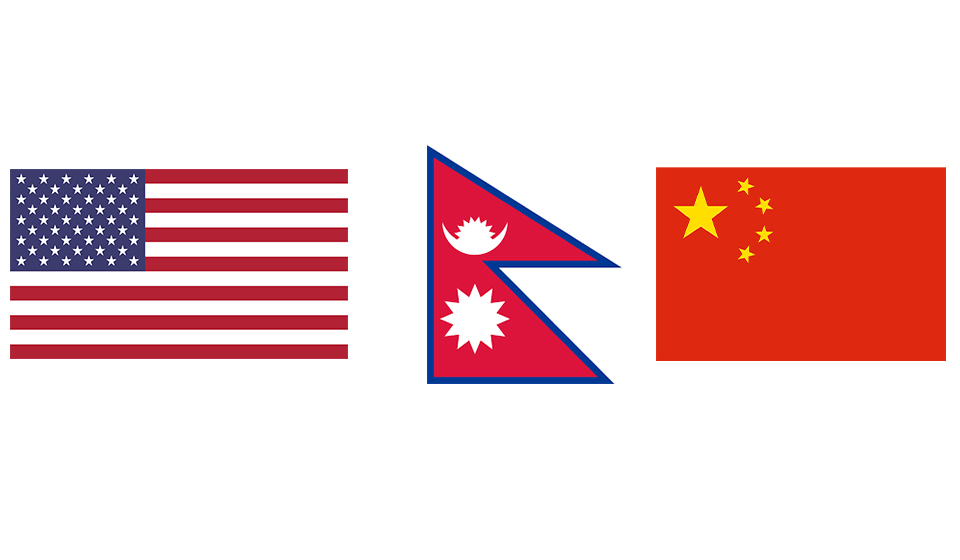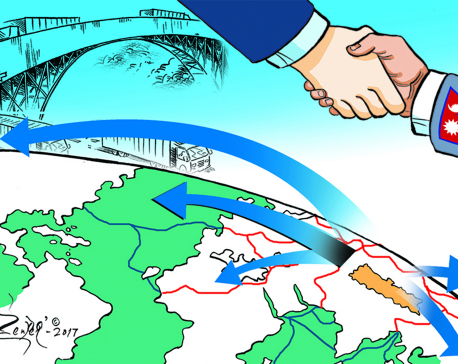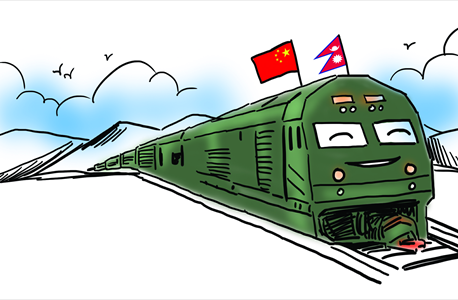
OR
Opinion


Dron Lamichhane
Lamichhane is affiliated with the Institute of Foreign Affairs (IFA), a government think tank under the Ministry of Foreign Affairs, and is pursuing his Mphil/Phd at the Department of International Relations and Diplomacy, TU.news@myrepublica.com
China and the United States came face-to-face over the issue of MCC agreement’s ratification through parliament. This is not a good sign for Nepal. The strategic rivalry between the US and China in Nepal should not be taken lightly.
Over the last few months, the rivalry between the US and China has become more visible in Nepal. US efforts to get the MCC Compact Agreement ratified through Nepal’s parliament and China's overall response to the MCC bring them face-to-face. The reflection of these two countries' growing competition in world politics is seen in Nepal too.
Recently, Chinese Foreign Minister Wang Yi made a three-day visit to Nepal over the weekend, which was called an unexpected visit. Wang’s visit to Nepal came on the heels of the ratification of the MCC Nepal Compact. Parliament ratified the $500 million American grant on February 27 amid reservations from Beijing. During the visit of US officials in Nepal, they gave a statement that if the MCC does not get the approval of the Nepali parliament, Americans will understand that it has not been ratified due to pressure from China. In the response to that statement, China had said that the MCC agreement would put Nepal's sovereignty at risk and labeled MCC as a potential Pandora’s Box for Nepal. Furthermore, during the Chinese Foreign Minister's three-day visit to Nepal, they released a statement of “Three Supports" for Nepal. Wang has stated that China opposes any attempt to undermine Nepal's sovereignty and engage in geopolitical games.
The Chinese understand that the US influence in Nepal has increased with the approval of the MCC agreement. According to a source, President Xi Jinping sent Wang Yi to Nepal as an envoy to understand Nepal's attitude toward China after the MCC approval. Also, that conveys the message of its strong presence in Nepal and develops the environment to promote China's multifaceted BRI project. Five years after the agreement was signed, China has become suspicious of the Nepali government and its political parties as projects under the BRI have not progressed as desired. China believes that the failure of the projects to move forward, even after five years of the agreement, may have had a 'geopolitical’ effect.
Nepal and China signed a Memorandum of Understanding (MoU) in May 2017. The MoU aims at promoting cooperation on policy exchanges, infrastructure connectivity, trade connectivity, financial integration, and connectivity of people. Nepal is a founding member of the AIIB. After Nepal signed up to China’s Belt and Road Initiative in May 2017, the government had formed two committees led by foreign and finance secretaries to identify projects for negotiations with the Chinese side. When the finance secretary-led committee listed 35 projects to develop under the initiative, it had brought interest in China’s funding in Nepal to a pitch fever. Later, the government of Nepal cut the number of proposed projects from 35 to nine at Beijing's request.
The nine projects are - Kerung-Kathmandu Railway, Ratomate-Kerung 400 KV Transmission Line, Koshi-Gandaki-Karnali Economic Corridor, Madan Bhandari Technical School, Kimathanka-Hile Road, Tamor Hydropower Project, Phukot Hydropower Project, Galchhi-Rasuwagadhi Road Upgradation, Dipayal-China Border Road. During the Second Conference on International Cooperation held in Beijing in April 2019, President Bidya Devi Bhandari participated along with 38 other heads of state. BRI was launched in 2013 to fund infrastructure projects across the world, taking advantage of China's massive USD 3.21 trillion reserves to further Beijing's global influence.
On the completion of four months of signing BRI, Nepal signed an agreement on the US's MCC project on September 14, 2017 for building a 400 KV high-voltage transmission line and upgrading roads. The MCC is the largest grant agreement Nepal has ever signed. Nepal was selected as eligible to develop a compact program with the MCC. Nepal was the first country in South Asia to qualify for the compact after it met 16 out of the 20 policy indicators. This is the first grant agreement that requires parliamentary approval. This was approved by parliament after the introduction of 12 points interpretative declaration.
China is our good neighbor and also a development partner. Both countries have relentless faith in the ideals of the Five Principles of Peaceful Co-existence. China has maintained friendly relations with every incumbent government of Nepal. Chinese financial and technical assistance to Nepal has greatly contributed to Nepal’s development efforts in the areas of infrastructure building, industrialization process, human resources development, health, education, water resources, and sports activities.
On the other hand, the US is the second country, after the United Kingdom, to recognize Nepal as an independent and sovereign country that led to establish diplomatic ties with Nepal on April 25, 1947. The USA was one of the first countries to extend development assistance to Nepal. Development cooperation harks back to the early 1950s. The US cooperation has been focused on the institutionalization of peace and democracy, inclusive governance, and sustainable economic growth, post-earthquake Nepal constructions.
Nepal’s relations with these two countries have been marked by friendly, mutual, and continuing support for the socio-economic development of Nepal. That’s why both countries are Nepal's close friends and development partners. However, China and the United States came face-to-face over the issue of the MCC ratification, which is not a good sign for Nepal. Thus, analysts say the strategic rivalry between the US and China in Nepal should not be taken lightly.
The MCC has already been ratified by parliament and has gone into implementation. However, in the case of BRI, during the Chinese Foreign Minister's visit to Nepal, Nepal and China signed nine agreements related to various projects, although no progress was made in advancing BRI projects. The government has conveyed the message that there should be clarity before the conclusion of the agreement on a BRI project, whether it is grant or loan. That’s why it needs further clarifications. The government further argues that it is difficult to move the BRI projects forward with loans at a time when the country is facing a difficult economic situation. Further, the government addressed the concerns raised by Chinese officials about the recent events. That the MCC is a development project and that is not aimed at any specific country. The MCC will focus only on the development of Nepal and no one should have any other doubts. Additionally, Nepal’s commitment to the “One China policy” will not allow anti-China activities in Nepal.
Because the MCC is based on a grant, it will not be an economic problem. However, an analyst said that the model of BRI was not based on grants. What we request is that the BRI projects need to be grant-based as our internal resources are not enough to build such big infrastructures. The implementation of the projects would be easier if the two countries reached a win-win situation on the implementation modality.
Further, we have to make a critical analysis of the fact that US and Chinese strategic and economic competition is ongoing on a global scale. We have seen the trade war and growing geopolitical and security rivalry in various fields. Thus, the strategic rivalry over the MCC projects and China’s BRI is a serious matter for Nepal. Both the MCC and BRI projects are no longer just ostensibly economic projects. Thus, Nepal should not be divided internally as Ukrainians are divided either as pro-Russian or pro-NATO allies. Let’s hope we will not face such a situation.
Thus, the political parties in Nepal must realize this and should adhere to the strong commitment to our national interests. Nepal must form its own set of strategies and policies to cope with this changing power dynamics. In this situation, if Nepal is able to maintain balance and harmony in its relations with both global powers, it will secure geopolitical leverage and boost economic prosperity; otherwise, it will face a geopolitical crisis. That’s why this is the time to show political maturity and diplomatic capability to balance not only the USA and China but also our southern neighbor, India.
You May Like This

Reassessing BRI
The connectivity that BRI offers will open Nepal to the world market through different sea ports. Nepal then will no... Read More...

Parties divided over Nepal-China railroad funding
KATHMANDU, May 6: Two major political parties — the ruling Nepal Communist Party (NCP) and the main opposition Nepali Congress (NC)... Read More...

BRI enhances cross border connectivity: Speaker Mahara
KATHMANDU, Sept 10: Speaker of the House of Representatives, Krishna Bahadur Mahara has commended the Belt and Road Initiative (BRI)... Read More...





Just In
- MoHP cautions docs working in govt hospitals not to work in private ones
- Over 400,000 tourists visited Mustang by road last year
- 19 hydropower projects to be showcased at investment summit
- Global oil and gold prices surge as Israel retaliates against Iran
- Sajha Yatayat cancels CEO appointment process for lack of candidates
- Govt padlocks Nepal Scouts’ property illegally occupied by NC lawmaker Deepak Khadka
- FWEAN meets with President Paudel to solicit support for women entrepreneurship
- Koshi provincial assembly passes resolution motion calling for special session by majority votes






_20220508065243.jpg)






Leave A Comment